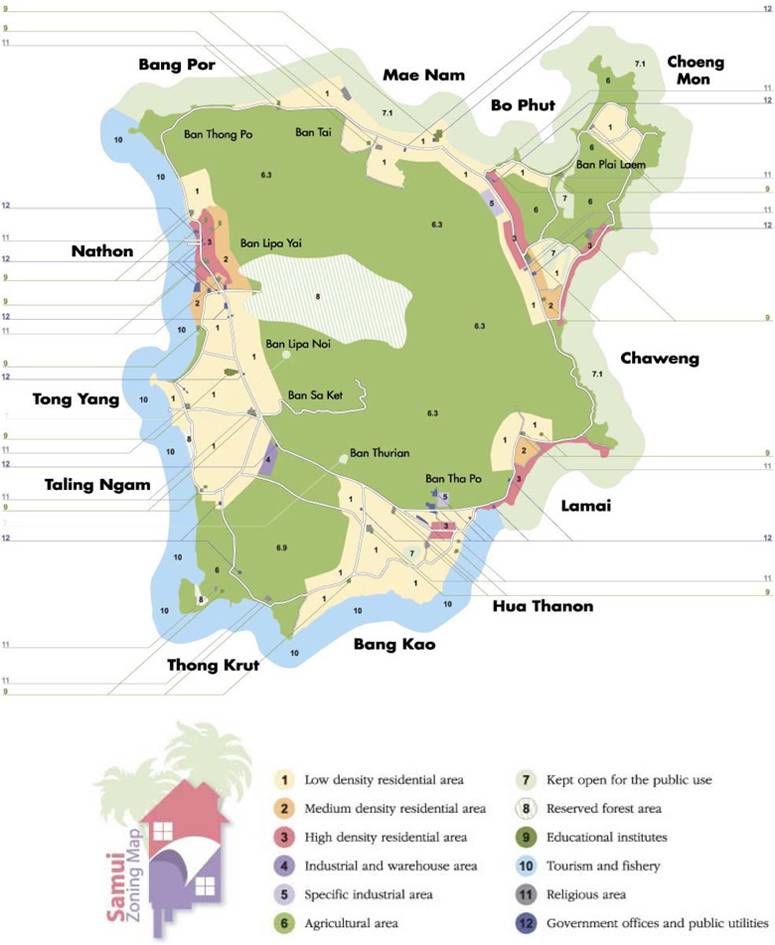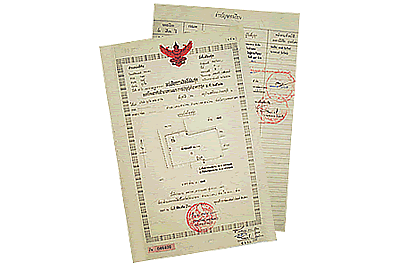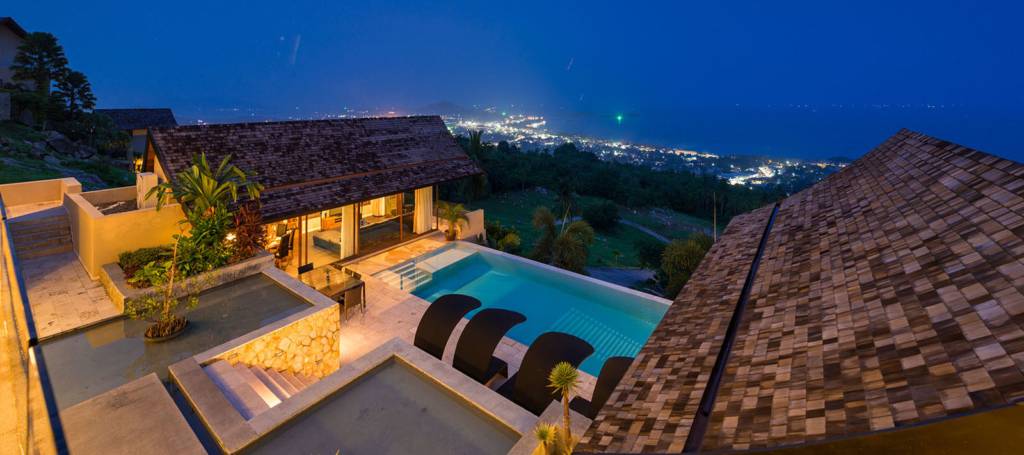Koh Samui Property Buyer's Guide
A Guide to Buying Property on Koh Samui
A. The Koh Samui Property Buyer's Market
Koh Samui island offers a huge choice for those looking at buying property on Koh Samui catering for all tastes and budgets from 30,000 USD 30sqm studio condominiums to multi-million dollar luxury villas and retreats. Most properties on the island are located around the more populated northeast quadrant from Bophut on the north through to Chaweng Noi on the eastern coast, however there are also plenty of options on the more peaceful west and southern sides of the island.
- Buying Villas and Houses
Villas and houses available to buy on Koh Samui range from small bungalow and garden homes starting at around 2-3 million Thai baht. Garden view villas with private swimming pools can be purchased from around 5-6M Thai baht and sea view villas with pools generally start from around 10-12M. Beachfront villas normally have sales prices starting around 30-40M due to the high prices beachfront land demands.
The most popular villas with Koh Samui property buyers are modern sea view properties with 3+ bedrooms located in the northeast of the island priced around 12-16M.
- Buying Apartments and Condominiums
The condo and apartment market is more limited on Koh Samui than other destinations in Thailand such as Phuket, Hua Hin and Pattaya due to stricter building and height regulations which don’t allow the same high-rise structures. Be that as it may, there are many condominium and apartment options on the northeast of the island with cheaper 30sqm units starting from around 30,000 USD. As with other destinations in Thailand, direct freehold ownership condominium units available to Foreigners demand higher prices than freehold units held by Thai holding companies.
- Buying Land
There are plenty of land plots for sale on Koh Samui with land prices only increasing over the years, especially beachfront land and land in the Chaweng Noi and Plai Laem areas on the northeast.
In 2006, the Thai government created zoning regulations on Koh Samui with different designations for each zone showing what can be built there. For example some zones are for agriculture only, some you can build villas but not hotels etc. Before buying land on Koh Samui, it is very important to engage with a lawyer to check the zone designation of the land and hence check what can or cannot be built there. Please see Section I for information on building and environmental regulations in zones where villas are allowed to be constructed as these regulations heavily influence the size and design of any construction project.

The Thai units of measurement for land are “rai”, “ngan” and “talang met” where 1 rai is 1,600 square meters, 1 ngan is 400 sqm and 1 talang ngan is 4 sqm.
TYPES OF LAND DEED TITLES

There are many types of land deed title document types in Thailand though only Chanote (or Nor Sor 4 Jor (NS4J)) and Nor Sor 3 Gor/Kor (NS3G/NS3K) land title deed types are suitable to buy for building property, sub-dividing or selling without any future legal issues.
Chanote Land Title (Nor Sor 4)
Chanote land titles are the only land ownership documents in Thailand that offer full private ownership offering accurately surveyed GPS plotted land linked to the national survey grid and unique numbered concrete markers in the ground
Nor Sor 3 Gor / Nor Sor 3 Kor Land Titles
These deeds are accurately surveyed by aerial survey, can be updated to full Chanote titles and can be sub-divided.
Nor Sor 3 Land Title (without Gor or Kor extension)
Nor Sor 3 land (without the Gor or Kor extension) should be avoided as the land is not accurately surveyed and borders of land can only be confirmed by surrounding land plots. Border disputes and ownership disputes are common with this type of land deed.
B. Finding the Perfect Koh Samui Property to Buy
When searching for your perfect property to buy on Koh Samui, the most important decision to initially make is the substance of the property you are looking for rather than style. Substance refers to aspects of the property that cannot be changed once purchased such as location, views and other aspects such as number of floors, and floor plans (to a certain extent). Once this decision has been made, its often important to look past certain style elements such as paint colours, furnishings, fixtures and tiling which can easily be changed to your own requirements.
C. Types of Property Ownership For Foreigners in Thailand

There are several distinct purchasing options open to Foreigners interested in buying property on Koh Samui. Under Thai law, Foreigners are unable to own land directly in their name however are able to own structures, properties or apartments built on a piece of land. Foreigners are effectively able to own and control the land upon which their property sits through a Thai limited company or via a lease. Both leaseholds and Thai limited companies have been a viable and highly successful vehicle for Foreigners buying property on Koh Samui for many years. A third option is to buy a condominium unit as Foreigners are able to own condominiums freehold under Thai law (though there are restrictions on the number of condos that are available to buy with this type of ownership for Foreigners)
- Ownership with Thai Limited Company
When buying property on Koh Samui, a foreigner can set up a Thai limited company as a vehicle of ownership for land with Thai shareholders and articles of association set up by the Buyer’s lawyer in such a way as to give the foreigner full control of the company and any assets of the company such as land and property. The foreigner can then use this holding company to own property(ies) on Koh Samui whether it be a plot of land, villa or apartment. The actual building (villa or apartment) on the land can be held directly in the foreign owners name but the building can also be held in the company which keeps fees/taxes lower if the property is eventually re-sold.
Some property owners sell their land or villa along with its Thai holding company meaning ownership can be transferred by a simple change of company Director or if that is not the case, a Thai lawyer can easily set up a new company to hold the property. The advantage of buying a property along with its holding company it that the change of ownership is done by a simple transfer of company director(s) meaning no taxes apply.
Lawyers set up the ownership structure in different ways and so its best to talk to a lawyer about how they set up their ownership structure for foreign buyers.
- Ownership Through 30 Year Lease
Foreigners buying property on Koh Samui may also have the option of controlling the land upon which a villa, house and apartment sits with a 30 year lease (30 years is the maximum leasehold term which can be registered at the Land Office under Thai law). Leases can be structured in a variety of ways: some are completely unrenewable, some leases are structured in such a way to allow the lease to renew upon the expiry date, some allow possibility for renewal to be negotiated near the expiry of the first 30 year term, some allow the owner to renew the lease to full 30 year term at any time, some are structured to allow to change to freehold ownership with a Thai holding company. The latter 4 options are possible through a personal contract between lessor and lessee.
For some villas sold on leasehold land, the lease costs are included in the purchase. For other properties there may be monthly or annual lease payments to be made throughout the lease period.
It’s also important to note that with houses and villas controlled through a lease, it is normally the land that is leased and the house will be directly in the Lessee’s name.
- Buying A Condominium Freehold

There is one freehold option for Foreigners wanting to buy property on Koh Samui with the Thai Condominium Act allowing Foreigners to buy freehold directly in their own name. One important fact is that the condominium developer must ensure that only 49% of the total area/units of the development are sold to Foreigners with direct freehold ownership. The other 51% of space in the development is available for foreigners to buy, but the only options would be to own the unit with a Thai limited company or leasehold as described above.
No-matter what purchasing method is used the property will be officially registered at the local land office. The Foreigner will also hold a property registration document referred to as a Tambien Baan or also known as the blue address book
D. Reasons For Buying Property on Koh Samui
Why you are buying a property in Koh Samui is an important aspect which often dictates the types of property options you look at. There are often 3 main reasons for purchasing property on the island; for pure investment, a holiday home or permanent residence.
- Buying for Pure Investment
When looking to buy a property as a pure investment, the most important objective is to look at property options from the perspective of future renters from the island’s lucrative holiday rental market. The most rentable properties are without a doubt on the northeast of the island with sea views, contemporary architecture and modern interiors.
Off-plan properties offer better value for money than completed properties and any possible risks associated with off-plan builds can be minimized by using an established local developer.
- Buying a Permanent Residence
Buyer’s looking for a permanent residency generally look for a comfortable property often set over just 1 floor with a garden and privacy from neighbours in areas with nearby conveniences and easy access without mountainous roads.
- Buying a Holiday Home
Those seeking a holiday home on the island look at properties which offer the comfort and privacy of a permanent residency near a beach or with sea views on the more rentable northeast of Koh Samui.
E. Return on Investment with Holiday Rentals
With the right property and villa management company, Koh Samui can offer a good ROI for investors and a good income for holiday home owners. Estate Samui Properties offer high quality villa management services, with our portfolio of Simple Luxury Villas holiday rental properties. Contact us for a free consultation.
F. The Process of Buying Property on Koh Samui
When you buy a property on Koh Samui, the purchase process generally takes 4-6 weeks to complete. To begin the process, an initial Purchase Reservation Agreement, containing the basic terms of the sale, is signed by both parties and a deposit payment made to and held by the real estate agent – usually 5% of the agreed sales price. This initial agreement will then give approximately 30-45 days for the Buyer’s lawyer to perform the Due Diligence process and produce the final Sales & Purchase Agreement to complete the property sale. If, for any viable reason the purchase fails Due Diligence and the Seller is unable to rectify any issue(s) then the property sale does not complete and the deposit is returned to the Buyer. Please note that some unscrupulous agents may ask for a larger deposit and keep some of that deposit if Due Diligence fails so its important to read through agency contracts very carefully
When buying an off-plan property, there are normally around 4 to 8 staged payments based on the stages of construction of the property. Transfer of ownership is usually completed after the final stage payment has been made.
G. Property Taxes in Thailand
Property taxes when buying or selling a property in Thailand are relatively low, however there are often more taxes involved when selling a property (up to 6.3% depending on ownership structure). The property taxation system in Thailand is quite complex and so it is important to engage with a lawyer to get full information before putting your property up for sale or committing to a sale.
- Government Fees and Taxes
– Transfer registration fee of 2% normally shared by Buyer and Seller
– Withholding tax of 1% normally paid by Seller
– Specific business tax 3.3% normally paid by Seller
– Stamp duty of 0.5% normally paid by Seller
Buying a Property by Company Takeover
When a property acquisition goes ahead by a company takeover (Thai or off-shore), no actual real estate transaction has taken place as the same company still owns the property, there has only been a change of company Director(s). This means that no real estate taxes are applicable.
For an off-shore holding company, nor fees or taxes are applicable in Thailand, though they may be applicable in another jurisdiction
Buying a Property without Company Takeover
When buying a property by transferring freehold ownership to another holding company, then a real estate deal has transpired and so real estate taxes and fees are applicable and can be up to 6.3% of the value of the sale plus possibly capital gains taxes. Transfer registration fees, withholding tax and either special business tax or stamp duty may be applicable.
H. Legal Advice and Recommended Koh Samui Law Firms
We can give you information and advice on your options to allow you to decide how to buy property in Koh Samui but laws and regulations do change so it is essential to engage with a professional law firm before moving forward with any purchase and to complete the Due Diligence process on the property. We can recommend professional, independent and established lawyers on Koh Samui who can give you full, completely up-to-date information and will ensure that every aspect of the purchasing process goes smoothly when buying property in Koh Samui.
I. Building and Environmental Regulations on Koh Samui
For those interested in building their own holiday villa on Koh Samui or investors looking at developing properties, it is very important to consider the environmental and building regulations on Koh Samui at the initial design stage. Building regulations on Koh Samui govern the height and area of buildings allowed in relation to distance from the beach with further environmental regulations governing design factors based on both height above sea level and the sloping of the land upon which the building sits.

Before starting construction, a building permit must be applied for at the local land office. The permit will be issued if building and environmental regulations are adhered to. Additional building regulations are brought into effect from time to time and so it is important to check for new regulations or talk with your architect/design team before applying for your building permit.
- Building Regulations
The basic Koh Samui building regulations, shown below, are based on distance from the beach. The exact position where is beach begins, of course, is open to interpretation and it is local authorities that make this decision.
Within 10 Meters from the Beach
No buildings are allowed.
Between 10 and 50 Meters from the Beach
Only buildings with 1 floor are allowed with a maximum height (including the roof) of 6 meters. Each stucture must have a maximum floor area of 75 square meters. The roof structure should be peaked and not flat.
Between 50 and 200 Meters from the Beach
Structures must be no more than 2,000 square meters with the maximum height, including the roof structure, not exceeding 12 meters. The roof structure should be peaked and not flat.
More than 200 Meters from the Beach
Each building must have a maximum height of 12 meters including the roof structure. The roof structure should be peaked and not flat.
Beach villas on Koh Samui abide by building regulations by building several small pavilions each with a floor space of less than 75 square meters.
- Environmental Regulations
Environmental regulations on Koh Samui are based on both height above sea level and also on the sloping of the land upon which the structure will sit. These regulations control what is allowed in terms of minimum area of land, maximum floor area, water drainage system, architectural design and roof design among other factors.
Height Above Sea Level
Less than 80 Meters Above Sea Level
No additional regulations. However property developments with more than 10 units require to have suitable water and waste treatment systems. An additional regulation, subject to hotels only, is that 50% of the land must be green (unbuilt on).
Between 80 and 140 Meters Above Sea Level
The building must be a single home of maximum height (including roof) 6 meters with land area a minimum of 400 square meters and suitable water drainage system. 50% of the land must be green (unbuilt on), the roof should cover at least 80% of the built area and match surroundings with the architectural design based on traditional Thai, tropical or local aesthetics.
More than 140 Meters Above Sea Level
Same regulations as for height between 80 and 140 sqm (above) with structures being no more than 90 square meters in area.
Sloping of Land
Less than 35 Degree Slope
No additional regulations.
Between 35 and 50 Degree Slope
The building must be a single home with land area a minimum of 480 square meters. Structures can be no larger than 80 square meters, 75% of the land must be green (unbuilt on) and 50% of this green land must have be planted with trees native to Koh Samui.
More than 50 Degree Slope
No building is permitted.
